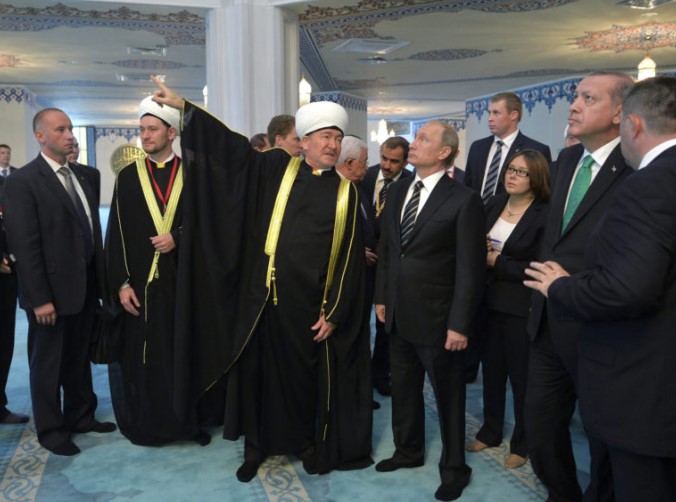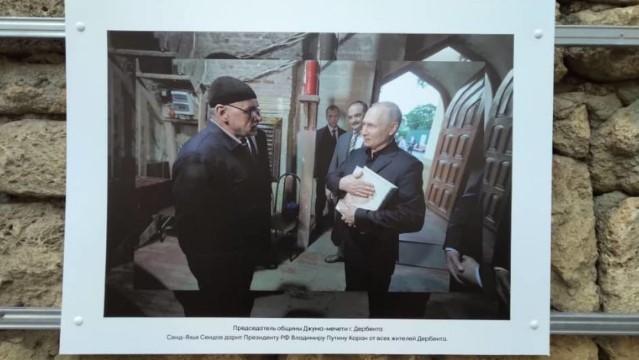Russia’s Strategic Vision Of The Islamic World And Its Traditional Values
Emeritus Professor Tan Sri Dato' Dzulkifli Abdul Razak
Opinion - Bacalah Malaysia
October 16, 2023

Say “Russia,” Islam does not feature at all on the screen.
If it does, it would be the last in the list. Nothing to shout about.
After all, Russia was founded on communism and the founding fathers were often associated with cliches like “religion is the opium of the people.”
The implications of which are varied and diverse, ranging from the physical to the spiritual, and often manifesting the negative that stands to stay in the mind much longer. Aided by the propaganda by the counter side it remains much longer.
Needless to say, the image of the other side is no better, but it is a familiar evil in reference to the evil you know rather than the evil you don’t. So, “Russia” is usually left out in the larger picture until very recently reaffirmed by the Strategic Vision ‘Russia – Islamic World’ dedicated to the ‘Traditional Moral and Spiritual Values as the Basis for Interfaith Cooperation’.
A meeting held on May 19, 2023 hosted by the Group of Strategic Vision that “aimed at developing and deepening the dialogue between secular and religious organisations and centres in Russia and the Islamic World states, their people, political and religious leaders in order to further strengthen the traditional moral and spiritual values shared by them.” And, to “preserve the cultural and historical heritage of Russian and Muslim people’s (sic).”
These values of moral, spiritual and cultural priorities are pillars that link the modern society with its history and traditions passed down through the generations.
They are commonly recognised as the basis for a person’s (sic) upbringing and education, self-perception, and the way they treat other people, society and the world around them.
And have become an integral element in their way of life. In Russia, it is recognised that Orthodoxy and Islam, in general, have made “decisive contribution to the formation and development of these values. Thus, between them mutual interest exists to preserve commitment to their traditional moral and spiritual values objectively.
In this trying time, it is vital for political and religious leaders, scientists and cultural figures, all concerned persons and structures to have a platform for a comprehensive analysis and assessment of the socio-political and religious situation in today’s world.

Meanwhile, the Russian President Vladimir Putin in his message recalled that “Russia has traditionally had close trusting relations with Muslim states both on a bilateral basis and as part of the collaboration with the Organisation of Islamic Cooperation (OIC).
More specifically, Russia launched Islamic banking, for the first time, as part of a two-year pilot programme on September 1.
These ties are built on partnership, respect for each other’s sovereignty and civilisation identity.” In addition, he acknowledged that “Russian Muslims play a significant role in expanding international contacts,” referring to the May 19 meeting as “the best testimony to that.”
With a sizeable Muslim population estimated to be up to 25 million, this further marks the first time the country’s legislation has officially endorsed its launch, although Islamic financial institutions have existed in Russia for some time now.
On August 4, the President signed a law introducing Islamic banking to assess its “feasibility”. The pilot programme is said to take place in four Muslim-majority republics – Tatarstan, Bashkortostan, Chechnya and Dagestan, areas known to already have the most experience in Islamic finance.
If the pilot programme proves to be successful, the plan is to introduce the new regulation to the rest of the country. As it is, the Islamic banking sector has an annual growth rate of 40 percent and is reportedly expected to reach a value of US$7.7 trillion by 2025.
As such, Islamic banking is said to be “a long-awaited initiative” since 2008 when Russia faced a financial crisis, “and began to look for alternative sources of cash”, according to various sources.
Later, the “Association of Russian Banks proposed allowing Islamic banking in the Russian Federation and establishing a committee within the Central Bank to regulate the activities of Sharia banks.”
Given the war in Ukraine, it allegedly “sped up the process of turning to Islamic banking” and prompted Russia to turn further away from the West and toward the East, which in many cases means greater links with economies of Muslim-majority countries,” noted some observers.
In short, the Strategic Vision “Russia – Islam World” in bringing traditional spiritual and moral values as the basis for interreligious understanding. More so, this year marks the 20th anniversary of the address of President Putin at the meeting of OIC in Malaysia.
It was then that the Russian leader proposed “to introduce a new more efficient format of cooperation between Russia and the Muslim world.”
As a result, Russia was granted observer status in the OIC. Some religious leaders even remembered the words of President Putin about the importance of Islam as a crucial factor of the social and political life of Russia and about its contribution to the spiritual development of the state.
With this in mind, the possibility of a brighter future for both Russia and the Islamic world can no longer be in doubt. In goes way back to the moment when the first mosque was erected in Russia in the 7th century. Much earlier than in any part of Europe.
- The writer is Rector, International Islamic University Malaysia (IIUM)
